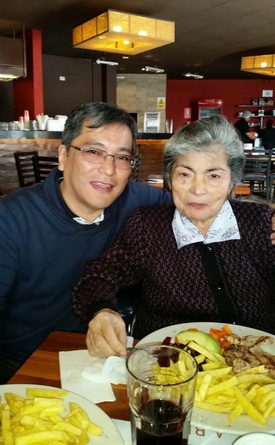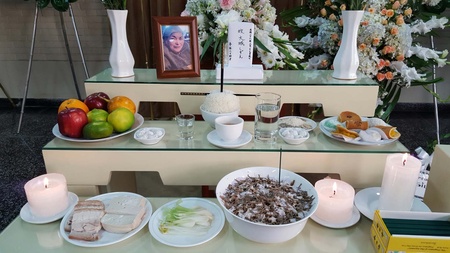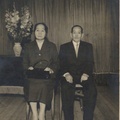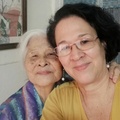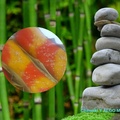When my mother passed away, I spent my time thinking about her, about what I did or didn't do, about the things that were left in "whatever," so I decided that a way to vent all that was inside me, that I didn't say , which I didn't tell, which I kept to myself, was writing it. I wrote it down and sheepishly passed it along to some family and friends. Almost no one answered me, but a long time later, I understood. One of my cousins told me that she answered me some time later because the sadness was such that she couldn't stop crying, it was as painful for them as it was for me.
Time passed and I saw that many Nikkei on Facebook shared some articles from the Discover Nikkei website that encouraged them to write stories about Nikkei food and our roots. I was encouraged to try to write a story about my mother, whenever I saw a sata andagi, I remembered her. There were so many memories that I wrote: “ Sata andagi, like my mother's….none .” I wrote it and had it there, without daring to send it. My wife Jenny read it and encouraged me to send it, I didn't say anything.
One day my sister came with some sata andagi, I love them, but before eating them I tell myself: I'm going to take photos of them, they ask for a photo to recreate the item. That night in front of the computer I wrote an email with the article and the photo, in fact I spent until dawn, without deciding, alone in front of the computer. I had everything written, the email to send and my finger on sending. He encouraged me and discouraged me, I dared and it all started.
My mother was a woman who never had it easy, just like her brothers. The older ones had to separate to be able to work, as they were left without mom and dad. The minors with their uncles, but helping on the farm. Along the way they met very good people, some relatives, others countrymen of their parents from Yonabaru, in Okinawa; as I describe in the article: “My mother, a destiny that is the product of Nikkei solidarity.” There I really highlighted the mutual help between the sonji's countrymen, which created in them values such as appreciating the family, an example of unity. Every time there was someone who needed help, all the brothers were there.
With marriage came children, we, with more problems. I tell the way she faced everything in her life, now married, in “The Nikkei Woman,” where I describe the common strength in our Nikkei women, personalized in my mother, a woman less than one and a half meters tall, but with a strength to the test of everything, of struggle and drive in the most difficult moments.
This is the end of all the stories I have written about my mother and my family. The displays of affection and messages have been satisfactory, even though I am not a writer and I don't consider myself that way either. My desire was just a therapy to write everything down, in order to close the stages of my life and see it like this, from afar, valuing my parents, my relatives, knowing that it is important where we come from, our roots, proud of everything the past, good or bad, that has served to be able to remember everything with a smile, to know where we want to go.
THE OBACHAN
It seems unbelievable, in a single day everything changed in our lives, suddenly and without wanting it, without thinking about it, life without her. Four years ago, when we started living together, everything began to revolve around my mother. We took her with us to her “new house”, she had been suffering from severe depression for a long time, she slept almost all day, did her things and then went to bed, I think it was difficult for all of us to adapt.
I saw her almost every day, but it was different living with her and my sister Susana and living with Jenny, my wife, and my children: Mayumi and Akio. We had difficult times, especially with my mother and Akio, both of them were already like two creatures vying for my attention, there was even a serious problem between them, perhaps a misunderstanding, something that made her feel like an intruder in the house. I had to speak strongly with Akio, my mother came with low self-esteem, perhaps feeling relegated for years, believing that she was no longer necessary and perhaps abandoning herself.
Akio, despite being a child, had to sacrifice and understand, but little by little we came out of that and everyone adapted, perhaps it was the precise moment that changed our luck and we were all able to live better together. Little by little, with the adaptation the depression went away, we all went out as a family, everything seemed fine, but my mother suffered in silence for years and never said anything about what hurt her. Everything to not worry me and not cause expenses, but from one moment to the next all the diseases appeared, the poor diet, things that I should not eat, the consumption of many analgesics and anti-inflammatories, the hypertension.
Being overweight made everything come to light from one moment to the next, a person with kidney failure (one step away from dialysis), pulmonary fibrosis (because they used to cook with firewood), a heart arrhythmia, in addition to having osteoporosis and osteoarthritis, she became diabetic at that age. We spent so many days in the clinic that it already seemed like my home, I slept there and saw little of the others. The scare was such that we thought it was over, but God gave us some more time.
I remember when Yuta Lidia told me: “I ask you a question: do you want Kamisama (God) to give you your mother even though one day she wakes up, sees you and asks you, who are you? That is very sad, or that perhaps she will become violent, if you still want to have mom and for her life to be prolonged, you have to take that risk, it can happen."
Inside of me I thought that she still couldn't leave, we had to give her even a little bit of happiness, she can't leave like that sad, thinking that maybe she never had something better, that her life wasn't worth it because she only came to suffer since little girl. How many times in her thoughts alone must she have already wanted to leave, the yuta Lidia told Jenny: “You who no longer have your mother, think of her as if she were yours.”
The truth is that it was like that, she accompanied me on this adventure of giving her everything that was best for her, no matter what, neither money nor time, even though at all times I sacrificed her, everything came first from my mother and her. She accepted it like that, she assumed her role as a daughter, regardless of the fact that we couldn't go out "because who is the oba going to stay with, who is going to prepare her gohan, we all have to eat the same otherwise the oba is going to stare at us eating something else." ; We have to arrive early because what is the oba going to eat, we can't go on a trip or on a weekend because who is the oba going to stay with?
But she has been unfailing, even I lost my patience, but not Jenny. He worried more than everyone, he knew what he took, what he should or shouldn't. I preferred that she talk to the doctor because he knew absolutely everything, down to the smallest thing, when he did something bad to her, she would just laugh and tell him “he's cheating on me.” Still, the oba laughed. In that sense, the oba had one more daughter and I cannot complain, but rather thank God for giving me such a wife.
© 2018 Roberto Oshiro Teruya


